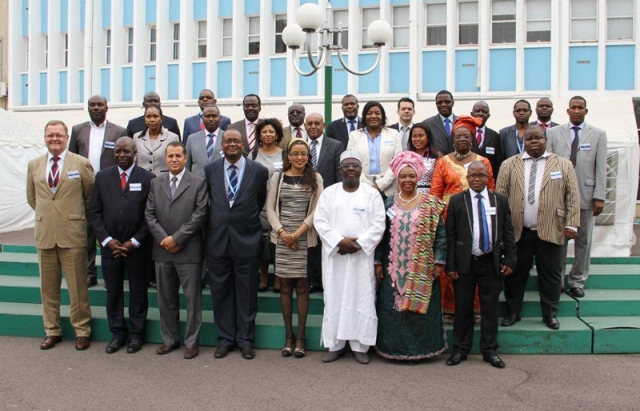We must prevent the production, marketing and use of unsafe medical products, says Dr Sambo, WHO Regional Director for Africa
 Brazzaville, 23 July 2014 - Tackling the scourge of substandard, spurious, falsely-labeled, falsified or counterfeit (SSFFC) medical products which threatens the health of millions of people in the African Region is the theme of a three-day meeting of the Working Group on Counterfeit medicines taking place in Brazzaville, Congo from 23-25 July 2014.
Brazzaville, 23 July 2014 - Tackling the scourge of substandard, spurious, falsely-labeled, falsified or counterfeit (SSFFC) medical products which threatens the health of millions of people in the African Region is the theme of a three-day meeting of the Working Group on Counterfeit medicines taking place in Brazzaville, Congo from 23-25 July 2014.
The meeting brings together experts from national medicines regulatory authorities, representatives from pharmaceutical industries associations, regulatory and legal experts in medical products regulation, Regional economic communities in Africa and from various international organizations.
In a message read on his behalf at the meeting by Dr Tigest Ketsela, Director of Health Promotion Cluster, the World Health Organization’s Regional Director for Africa, Dr Luis Sambo said: “The safety and efficacy of medical products are major public health concerns which require joint actions of all sectors of government and partners to ensure that their manufacture, trade and use are effectively regulated”.
SSFFC medical products, whether sold in street markets or on unregulated websites, is a grave public health problem, as they often are of poor quality, unsafe and ineffective. They promote drug resistance, lead to loss of confidence in health professionals, pharmaceutical manufacturers and distributors and health systems.
“We must prevent production, marketing and use of unsafe medical products in our Region as they result in therapeutic failure and ultimately death” he added.
Through its prequalification programme, WHO provides support to national regulatory authorities to address the problem of counterfeit medicines. Between 2013 and 2014, notifications and investigations initiated from African countries, led to important alerts about the circulation of fake anti-malarial products in West and Central Africa. National medicines regulatory authorities were informed immediately so they could take appropriate measures to protect public health.
Recalling various ongoing efforts at the global and regional level to combat counterfeit medicines, the Regional Director drew particular attention to discussions by Health Ministers at the Sixty-third session of the Regional Committee for Africa held in Brazzaville in 2013. They underscored the need for adequate funding to strengthen national regulatory authorities to effectively implement their functions and avoid conflicts of interest. They also recommended prioritizing the creation of the Africa Medicines Agency (AMA), involving the regional economic communities and the African Union Commission (AUC).
In April 2014, the first joint AUC-WHO Health Ministers meeting in Luanda, Angola, endorsed the establishment of the AMA and requested the AUC and WHO, to establish a task team for this purpose with due regard to regional representation and experts required.
In recognition of the ability of SSFFC medical products, if unchecked, to seriously undermine the progress made in tackling health issues in the region, a Regional Working Group with representatives from Member States and key stakeholders, has been formed.
It is expected that during the three-day meeting, the Working group will among other actions, review progress made in the Region to prevent and control SSFFC medical products, analyze the extent of these products and provide recommendations to countries on the way forward to fight the production and circulation of SSFFC medical products in the Region.
_____________________________________
For media inquiries you can contact:
Dr Ossy Kasilo, Coordinator Health Technologies
Email: Kasiloo [at] who.int
Tel: +4724139268
Mr C. Boakye-Agyemang, Communications Officer
Email: Boakyeagyemnagc [at] who.int
Tel: +4724139420


